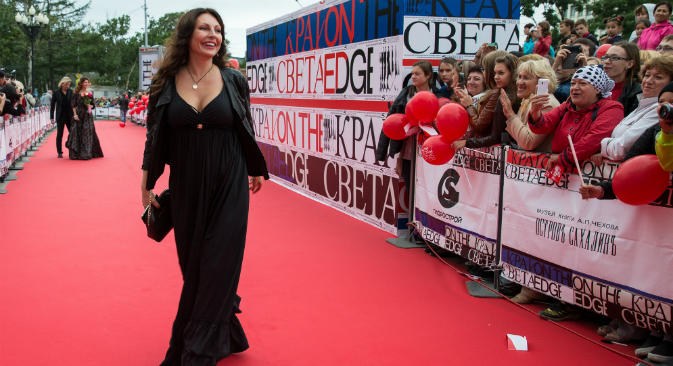
Film personalities received a rousing welcome in Sakhalin. Source: Press photo/ www.sakhalinfilmfestival.ru/
Cameras flashed and an excited crowd welcomed filmmakers from all over the world, as ‘On the Edge,’ the fifth annual Sakhalin International Film Festival kicked off in Yuzhno-Sakhalinsk.
Each August, the small and usually quiet city with a population of 200,000 turns into a global cinema hub, hosting a wide array of actors, directors and producers from both, Russia and abroad. The festival always has a special focus on Asia.
“There is an apparent imbalance in the flow of culture,” program director Alexey Medvedev says. “Every day hundreds of Japanese right-hand drive cars come to Russia from Japan, but how many films come from Japan to Russia every year,” he asks. “Material exchange can't exist without cultural and spiritual exchanges.” Medvedev wants to fix this injustice.
Held for the first time in 2011 in a test mode, from 2012 onwards, the Sakhalin International Film Festival has been managed by a team headed by Medvedev and general producer Alexey Agranovich.
Fast forward to 2015, visitors grew from about 10,000 in 2012 to over 35,000 this year, while the number of venues grew from 1 to 25.
“Over the last five years, On the Edge has become not just a significant cultural event, but Sakhalin's new brand,” Sakhalin’s interim governor Oleg Kozhemyako said, while greeting the festival attendees. “This year screenings, seminars and creative workshops will take place not just in the capital Yuzhno Sakhalinsk, but in many districts, including the Kuril Islands,” he added.
This year's program was very rich indeed. Among the guests were people as diverse as world-renowned Iranian director Mohsen Makhmalbaf and Lav Diaz, an indie visionary from the Philippines. Other guests include Armenian director Aram Shakhbazyan and Li Xiaofang, whose films, “Moskvich, my love” and “Nezha” respectively were part of the competition.
Korean director Kim Hee-Jung’s “Snow Paths” featured in a special ‘Neighbors. Friends’ program, and Japanese actress Natsuko Hori took an 8-hour ferry ride from Japan to the port of Kholmsk followed by a 2-hour car ride to Yuzhno Sakhalinsk to present one of the competition films, Kim Ki-duk’s “Stop,” which is dedicated to the Fukushima disaster.
“On the Edge is very unique” Hori said while sitting on a plastic chair at a seaside festival picnic, where the jury, filmmakers, film critics and festival staff alike are tasting delicious local seafood, including freshly-made fish soup, several kinds of mollusks and at least three different types of salmon.
“The guests are treated very nicely, I don't remember any other film festival, where actors, journalists and festival organizers would have a chance to spend time together and bond to such an extent,” Hori added.
Russia was represented at the festival by famous actors of different generations such as Danila Kozlovsky, Anna Chipovskaya, and Victoria Tolstoganova, who could rarely manage to cross the festival plaza without being stopped for a photo or an autograph.
Russian films included Levan Gabriadze's “Unfriended,” which with a $1 million budget grossed $59 million globally and Nigina Sayfullaeva's “Name Me,” which won prizes in the Stockholm and Tallinn film festivals.
“I like how the festival affects the city,” said Maria Larionova, 33, who took a few days off her work at the Environmental Ministry to be able to participate in the mobile film workshop. “It's like in ancient times when the entire town would gather on a central square and be together. It's a great opportunity for Sakhalin residents to connect with unique cultural environment, normally unavailable in such depth. It's a charge, that lasts for a year.”
The jury's Grand Prix as well as the special award went to “Mustang” from Turkey, an elaborate drama about forced marriages and women's independence. “I'm really happy our voices were heard here in Sakhalin,” said Elit Iscan, who acted in the Turkish film.
Although there is tremendous enthusiasm for filmmaking in Sakhalin, many aspiring filmmakers complain about the lack of funding for their projects. Interim Governor Kozhemyako promised to “resolve the issue” by creating a regional cinema fund in Sakhalin to support local filmmakers
On the Edge has been largely responsible for creating an interest for non-commercial cinema in Sakhalin. The festival promises to be a mainstay in the cultural calendar of the Russian Far East.
Subscribe to RBTH's Asia related content
All rights reserved by Rossiyskaya Gazeta.
Subscribe
to our newsletter!
Get the week's best stories straight to your inbox